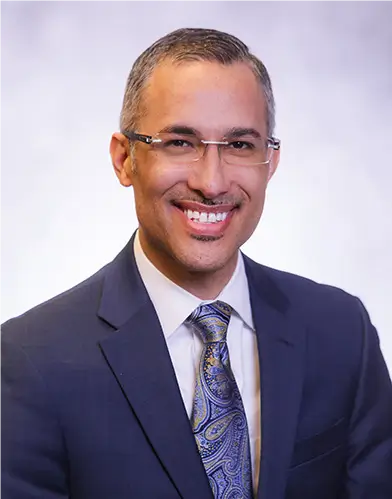MS in Complex Health Systems Leadership

Program: Complex Health Systems Leadership
Degree: Master of Science
Credits: 36
Length of Program: 2 Years / 4 Semesters
Term: Fall
Format: Hybrid
Our MS in Complex Health Systems Leadership equips individuals with the strategic and managerial skills needed to navigate the intricate landscape of healthcare organizations, addressing challenges such as resource allocation, policy implementation, and interdisciplinary collaboration, all with a health equity lens.
Students will have the opportunity to be a part of the only master’s program in complex health systems leadership that directly incorporates the Political Determinants of Health framework by Daniel E. Dawes. By learning from Dean Dawes himself, as well as other top-ranked faculty, who incorporate his framework into effectuating change at the most upstream levels to have the greatest impact on moving the health equity needle forward. This program will be the first to apply such a unique lens across countries that may be facing similar challenges and sharing novelle approaches to developing solutions together.
What to Expect:
- The MS in Complex Health Systems Leadership requires a completion of a minimum of 36 credit hours, including choosing a thesis or capstone project. Classes will be held in a hybrid format with a combination of virtual and select in-person sessions offered at our Meharry Medical College campus.
- This program is intended to accommodate the working adult; therefore, courses are offered during the day and evenings.
- Students will engage with world-class faculty who are passionate health equity champions, bringing a wealth of knowledge and professional experience to the classroom from various spaces including the Centers for Disease Control and Prevention, The White House, the United States Congress, World Health Organization, United Nations General Assembly, U.S. Department of Health and Human Services, Health Insurers, Biopharmaceuticals, Biotechnology, Medical Device Companies, Disparities & Health Equity Research, Law & Policy, Responsible Artificial Intelligence, Geographic Information Systems, Medicine, Public Health, Management, Urban & Regional Planning, Clinical Trials, and more.
- This program aims to provide both domestic and global professional and scholarly experiences. Additionally, students will participate in distinguished lectureship series and skill-based workshops.
- Incoming MS students will be individually matched with renowned subject matter experts and leaders to support them through their academic and professional endeavors.
Students looking to participate in this program come from a variety of professions and training backgrounds
The SGH MS in Complex Health Systems Leadership candidate is well-rounded and attuned to the multifactorial complexities of health systems and organizations in the United States, and countries abroad. At their core, these individuals are health equity champions within their own ecosystem, and will come from a variety of professional and academic backgrounds. Some examples include public health, medicine, nursing, allied health, mental and behavioral health, STEM, social sciences, political science, health law and policy, justice and advocacy work, social work, community health work, etc.
While there is no one perfect mold, the ideal candidates will be:
- self-motivated,
- bring their intellectual curiosity and lived experiences – both personal and professional, into the classroom,
- engaged in various health-related topics both in and outside of the classroom,
- and committed to the advancement of health equity for all.
This program is fully accredited by the Southern Association of Colleges and Schools Commission on Colleges.
Admissions Requirements:
Applicants must satisfy all admission requirements. Final admission decisions will be made by the School of Global Health Faculty Admissions Committee (FAC). Admission decisions will be based on all aspects of the application, including:
(1) Prior college-level academic performance of the applicant in a baccalaureate or master’s program at a regionally-accredited institution, including coursework and independent research projects
(2) Prior and/or relevant work experience
(3) Your personal statement and short answer responses submitted via the application portal
(4) Your three recommendation letters requested through the application portal
(5) Test scores are optional: graduate level test scores may be submitted if you believe it will enhance your overall application
Application Deadline Fall 2024
July 1, 2024*
*All documentation must be submitted by deadline date.
Application Process
The SGH Faculty Admission Committee cannot review any application until all documents have been received. Applicants may check the status of their application by logging into their online account.
Step 1
Complete a formal application here: https://go.mmc.edu/apply/
- Select School of Global Health to access MS in Complex Health Systems Leadership Application
- Complete Personal Statement prompt: All applicants are required to provide a personal statement answering the question below. The response should be limited to no more than one page, minimum 500 words, serif font, font size 12. “I) What does health equity mean to you? II) How will you utilize your degree to advance your career? The student is encouraged to discuss lived experiences (academic, professional, or personal) in their response.”
- Complete Short Answer Questions: complete the short answer questions with a maximum of 300 words permitted per response, located on the online application
- What one outstanding contribution do you hope to provide to the inaugural program cohort?
- Based on your academic or professional experience(s), describe your contributions towards eliminating health inequities/disparities in your immediate environment.
- Identify one factor in your past experiences that has been most influential in your decision to address global health inequities.
Step 2
Gather your application documents:
- Letters of Recommendation
Three letters of recommendation are required, at least two of which must be from an academic mentor (major professor, thesis advisor, etc.) who can speak to the applicant’s potential to undertake graduate studies.
- Official transcripts
Applicants must submit official transcripts of coursework attempted and completed at all previous colleges and universities whether or not a degree was earned at the institution. Please ask your institution to send official college transcripts electronically directly to the School of Global Health at sghenrollment@mmc.edu.
If the institution prefers to mail transcripts, please use this address:
School of Global Health
Meharry Medical College
3401 West End Avenue
Suite 160
Nashville, TN 37203
All submitted transcripts become the property of the Meharry Medical College and will not be returned.
Test Scores (specified below)
The GRE, GMAT or any other admissions test score requirement is optional for applicants applying to the School of Global Health. Should an applicant wish to submit them for admissions consideration, please send them directly to Meharry Medical College electronically.
STEP 3
Final Decision
- Once all documents have been appropriately submitted to School, they will be reviewed by the SGH Faculty Admissions Committee.
- All applicants will receive a final decision response by e-mail.
STEP 4
Admitted Students
- Accept your admission decision by submitting your seat deposit. This will be sent via e-mail.
- Complete your FAFSA and make sure to send information to Meharry Medical College.
- Our central Office of Admissions and Recruitment at Meharry Medical College will contact you to begin your journey as a Meharrian.
To learn more about financial aid at Meharry visit: https://home.mmc.edu/financial-aid/
- All applicants possessing a baccalaureate degree must have earned a minimum cumulative GPA of 3.0 (on a 4-point scale) in the last 60 semester hours (approximately two years of work).
- Applicants possessing a master’s degree must have earned a minimum cumulative GPA of 3.0 (on a 4-point scale).
- Applicants possessing a baccalaureate degree including some graduate work, but not a graduate degree, must have earned a minimum cumulative GPA of 3.0 (on a 4-point scale) individually in both sets of coursework.
Core Coursework:
- Social, Mental, and Behavioral Health (3)
- Political Determinants of Health (3)
- Health Disparities and Health Equity (3)
- Foundations in Health Policy/Law (3)
- Introduction to Health Economics (3)
Total: 15 Credit Hours
*Courses and course title are still in review process and subject to change.
Specialization coursework (include total credit hours and course names in a list):
Students are expected to complete 18 credit hours in specific coursework geared towards varying topics related to factors affecting health outcomes, political determinants of health, health disparities and health equity, social, mental, and behavioral health, foundations in health policy and law, and health economics.
Students who enroll in the MS in Health Equity program will be exposed to a wide spectrum of coursework such as but not limited to:
- Health Services and Policy Research
- Leadership and Ethics
- Program Planning and Evaluation
- Crisis & Emergency Risk Communication
- Advanced Health Economics Approaches
- Clinical Trials and Research
In addition, students will have the opportunity to gain exposure to health disparity and equity research abroad or domestically, through an applied learning experience.
Total: 3 Credit Hours
Capstone Project:
Consistent with Meharry Medical College’s goal of developing distinctive and pioneering approaches to teaching, the School of Global Health’s Master of Science program in Complex Health Systems Leadership, will pair each student up with a faculty member to guide them in the development of their master’s capstone project and research. Each student is expected to conduct independent research in each semester of year two respectively. The student is at liberty to choose a complex health issue related to their own research topic, and complete a capstone project based on 1) their professional experience, 2) their academic experience, 3) their Applied Experiential Learning, or 4) any combination thereof. Conferral of the master’s degree is contingent upon a student’s successful showcase of their capstone project in the final semester of year two.
Celeste Philip, MD, MPH,
Professor of Public Health Practice
School of Global Health
Celeste Philip, MD, MPH, is a physician leader with two decades of public health and medical experience in local, state, federal, and international settings. She…
Fazal Khan, MD, JD,
Department Chair, Population Health
Professor of Health Law, Policy, and Management
Dr. Fazal Khan, MD, JD, serves as the department chair for population health and professor of health law, policy, and management. Dr. Khan brings a…
Michael C Caldwell, MD, MPH, FACP,
Professor of Public Health Practice, School of Global Health
Associate Vice President, Vaccine Research & Education Chief Medical Officer, Dry January USA Associate Professor, Internal Medicine, and Professional & Medical Education Meharry Medical College
Dr. Caldwell joined Meharry Medical College in August 2021. He provides leadership for health communications, vaccine research & education, as well as alcohol research, education…
Cost per credit hour for the 2024-2025 academic year
The total cost per credit hour for the current academic year is estimated to be $1,626*.
Estimated annual tuition for 2024-2025: $29,278
Enrolled students are expected to complete a total of 18 credit hours during the first year of the program.
*This rate is subject to change on an annual basis.
Scholarship details coming soon!
 Alicia Holloway, EdD
Alicia Holloway, EdD
Assistant Vice President of Curriculum Development and Academic Affairs,
School of Global Health,











